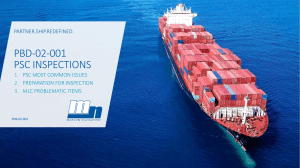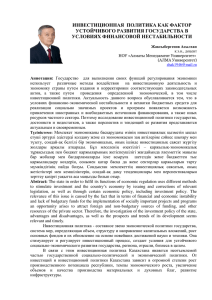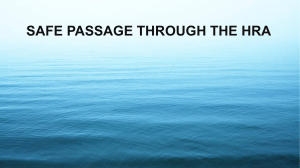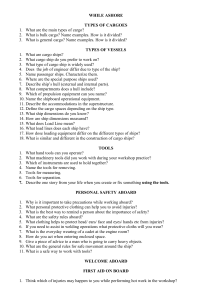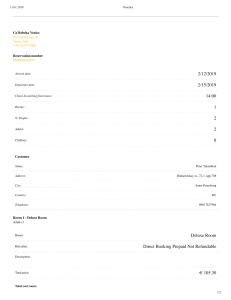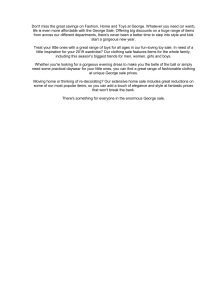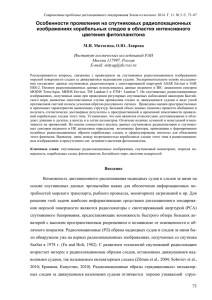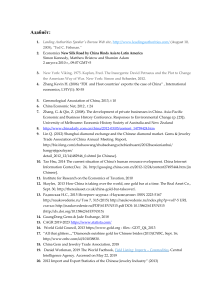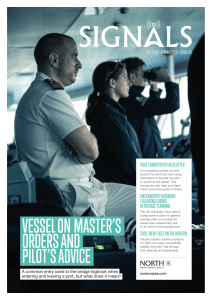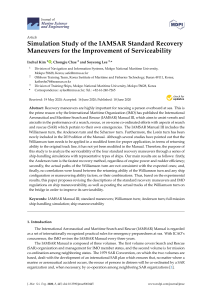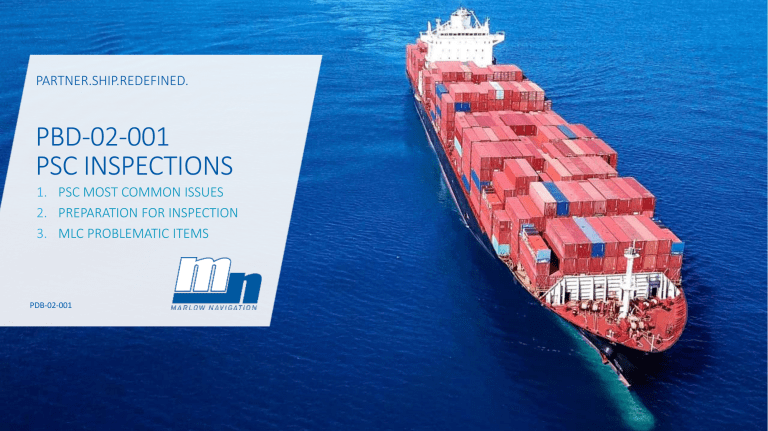
PARTNER.SHIP.REDEFINED. PBD-02-001 PSC INSPECTIONS 1. PSC MOST COMMON ISSUES 2. PREPARATION FOR INSPECTION 3. MLC PROBLEMATIC ITEMS PDB-02-001 PARTNER.SHIP.REDEFINED. 1 PSC INSPECTIONS TOP 3 CATEGORIES OF DEFICIENCIES – 2019 REPORT PARIS MOU 1. Fire Safety 2. Safety of Navigation 3. Life-saving Appliances US COAST GUARD 1. ISM 2. Fire Safety 3. MARPOL Annex I BLACK SEA MOU 1. Safety of Navigation 2. Life-saving Appliances 3. Fire Safety INDIAN OCEAN MOU 1. Fire Safety 2. Safety of Navigation 3. Life-saving Appliances TOKYO MOU 1. Life-saving Appliances 2. ISM 3. Fire Safety AMSA 1. ISM 2. Fire Safety 3. Emergency Systems PARTNER.SHIP.REDEFINED. 2 PSC INSPECTIONS AMSA 2019 PSC inspection results saw an ongoing reduction in the detention rate of vessels to 5.1 per cent from 5.5 per cent in 2018 and down from a peak of 9.2 per cent in 2011. This is the lowest detention rate since 2006. However, as observed in past PSC annual reports, the most frequent cause of detention since 2010 still relates to ineffective implementation of the safety management system required by the International Safety Management (ISM) Code. Since 2015, issues concerning passage planning, conduct of voyages and the operation of vessels have contributed significantly to the number of ISM detentions and this remains a significant concern for AMSA. To address this AMSA issued a marine notice MN 2019/02 (Responsible navigational practices), in 2019 with a view to highlighting issues associated with navigational practices. Since 2014, the same material issues have featured in the top five categories for detention. This was repeated in 2019 with fire safety (17.4%), emergency systems (16.5%) and life-saving appliances (14.7%). Pollution prevention (11.5%) was among the top five categories of detainable deficiencies for the second consecutive year. PARTNER.SHIP.REDEFINED. 3 PSC INSPECTIONS US COAST GUARD In 2019, the number of detentions have decreased compared to the previous year. Nonetheless, the most notable causes of deficiencies are related to the following: 1. Failure to implement the safety management system (SMS). 2. Fire prevention concerns. 16 detainable deficiencies were identified related to accumulation of oil in the engine room such as fuel leaks, oil-soaked lagging and excessive amounts of oil in the bilges. Although only a small percentage of deficiencies (9%) were MARPOL Annex I related, it has to be emphasized that the most common cases were related to oily water separators not being able to produce an effluent below 15ppm. PARTNER.SHIP.REDEFINED. 4 PSC INSPECTIONS PARIS MOU PARTNER.SHIP.REDEFINED. 5 PSC INSPECTIONS TOKYO MOU It is noted that both number of detentions and detention percentage increased in 2019, after respective seven years’ and ten years’ continuous decrease. It is further observed that the number of under-performing ships published and number of individual ships involved also rose in 2019. ISM related detainable deficiencies have remained in the top three detainable deficiency categories for several years. One third of all detentions are on the grounds of a major non-compliance with ISM reflecting the importance of ISM to the effective operation of ships. PARTNER.SHIP.REDEFINED. 6 PSC INSPECTIONS INDIAN OCEAN MOU The average number of deficiencies per inspection in 2019 (1.84) has slightly decreased compared to the previous year (2.07). Despite the decrease, majority of the 2019 deficiencies remain to be related to fire safety, safety of navigation and life-saving appliances. PARTNER.SHIP.REDEFINED. 7 PSC INSPECTIONS BLACK SEA MOU The most significant number of operational deficiencies found in 2019 was in the area of safety of navigation, life saving appliances followed by health protection, medical care, social security followed by fire safety measures and structural conditions which constitutes 56.3% of the total deficiencies found. PARTNER.SHIP.REDEFINED. 8 PSC INSPECTIONS FINDINGS EXAMPLES Gangway is not provided with safety net PARTNER.SHIP.REDEFINED. Improper stowage and securing of oxy/acetylene tanks 9 PSC INSPECTIONS FINDINGS EXAMPLES Navigation light cover was painted over PARTNER.SHIP.REDEFINED. Missing securing bolts / butterfly nut for ventilation cover, vent cover welded to structure and corroded handrails 10 PSC INSPECTIONS FINDINGS EXAMPLES Flooded emergency pump room PARTNER.SHIP.REDEFINED. Oily rags placed around the engine (fire hazard) 11 PSC INSPECTIONS FINDINGS EXAMPLES Oil around engine machinery / poor housekeeping PARTNER.SHIP.REDEFINED. Corroded/damaged ballast vent head cover 12 PSC INSPECTIONS FINDINGS EXAMPLES Garbage bags stored under the engine room gratings PARTNER.SHIP.REDEFINED. Oil on engine room flooring 13 PSC INSPECTIONS FINDINGS EXAMPLES Corrosion due to leaking machinery pump and illegal drip pan/bucket underneath PARTNER.SHIP.REDEFINED. Telephone handset not properly secured. Damaged holder 14 PSC INSPECTIONS FINDINGS EXAMPLES Hole on the accommodation structure PARTNER.SHIP.REDEFINED. Filthy / sub-standard cabin 15 PSC INSPECTIONS FINDINGS EXAMPLES Damaged toilet flush tank PARTNER.SHIP.REDEFINED. Rotten vegetables 16 PSC INSPECTIONS Preparation for Inspections 1. First impression counts! Mooring lines and gangway arrangements, security check on boarding, notification of the ship’s command, pick up at the access point and impression of vessel’s condition on the way to the master’s cabin. 2. Vessel’s topside, galley, cabins, stores, cargo office, engine room and all other areas must be clean and orderly. 3. Records must be organized and readily available. 4. Crew must be adequately familiarized with emergency procedures/drills. A common deficiency. When conducting the drills regularly and properly, crew may become aware of damaged or inoperable life-saving or fire-fighting equipment. PARTNER.SHIP.REDEFINED. 17 PSC INSPECTIONS Common Practice during Inspections 1. Meet the PSC inspectors at embarkation, ask for I.D. and escort them to the Master’s office. Request for an opening meeting. Ask for clarifications if necessary. 2. Introduce the key officers, who will escort the PSC inspectors in each areas. If they are on duty, it must be mentioned to the PSC inspectors. 3. The key officers must be professional and must keep notes of any identified deficiencies. If possible notify command immediately of identified deficiencies and initiate corrective actions on the spot. 4. The ship’s command must clarify potentially unjustified deficiencies and detentions BEFORE signing the inspection report. Diplomacy and cultural awareness are required, in order to ensure positive outcome. 5. For potential major deficiencies and/or detention notify the company immediately and still during the ongoing inspection. 6. Request for a closing meeting. Ensure the content of the report by directly inquiring if there is nothing that suggest a detention. Escort the PSC inspectors until disembarkation. PARTNER.SHIP.REDEFINED. 18 MLC INSPECTIONS S.E.A Contract Extensions For short contact extensions a new SEA print out is not always required. This should be pointed out to inspectors POEA Section 19: Section 19 POEA ITF Ver.di (Annex 1): ITFCBA Ver.di CBA (Annex 1) Marlow Conditions: MarlowStandard StandardTerms Terms & Conditions If the ship is outside the Philippines upon the expiration of the contract, the seafarer shall continue his service on board until the ship’s arrival at a convenient port and/or after arrival of the replacement crew provided that, in any case, the continuance of such service shall not exceed three months. The seafarer shall be entitled to earned wages and benefits as provided in his contract. Duration of Employment The maximum period of engagement to in Article 5 shall be nine (9) months, which may be extended to 10 months or reduced to eight (8) months for operational convenience. Article 5: Duration of Employment 5.1 A seafarer shall be engaged for a period of 9 (nine) months for both officers and ratings or as otherwise mutually agreed and such period may be extended or reduced by one month for operational convenience in Company’s option. The employment shall be automatically terminated upon the terms of this Agreement at the first arrival of the ship in port after expiration of that period, unless the Company operates a permanent employment system. This information is also available in the Marlow Vessel Portal, Under PSC inspections section. ! In case of questions, please contact your agency. PARTNER.SHIP.REDEFINED. 19 THANK YOU! Marlow Navigation Co. Ltd. 13 Alexandrias Street, 3013 P.O. Box 54077, CY-3720 Limassol, CYPRUS Tel: +357 25882588 | Fax: +357 25882599 E-Mail: [email protected] Website: marlow-navigation.com PARTNER.SHIP.REDEFINED. 20
